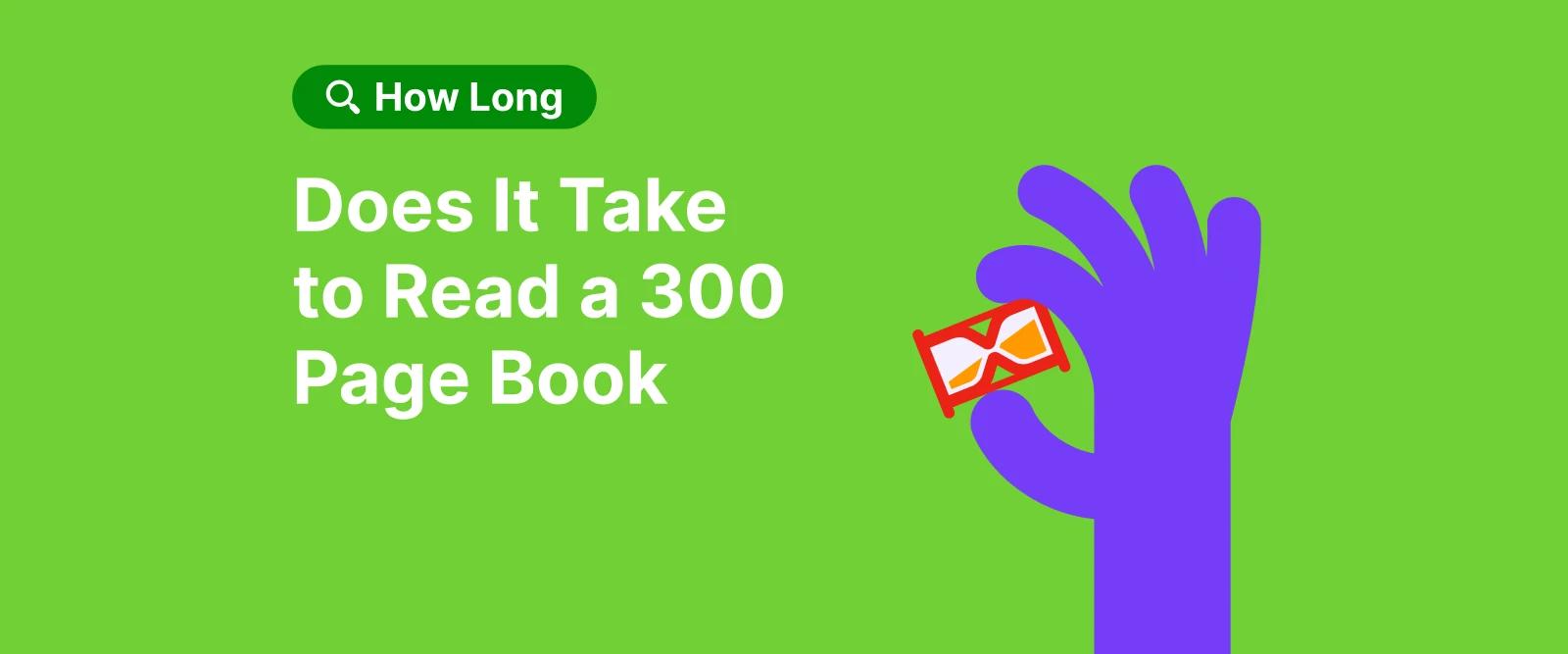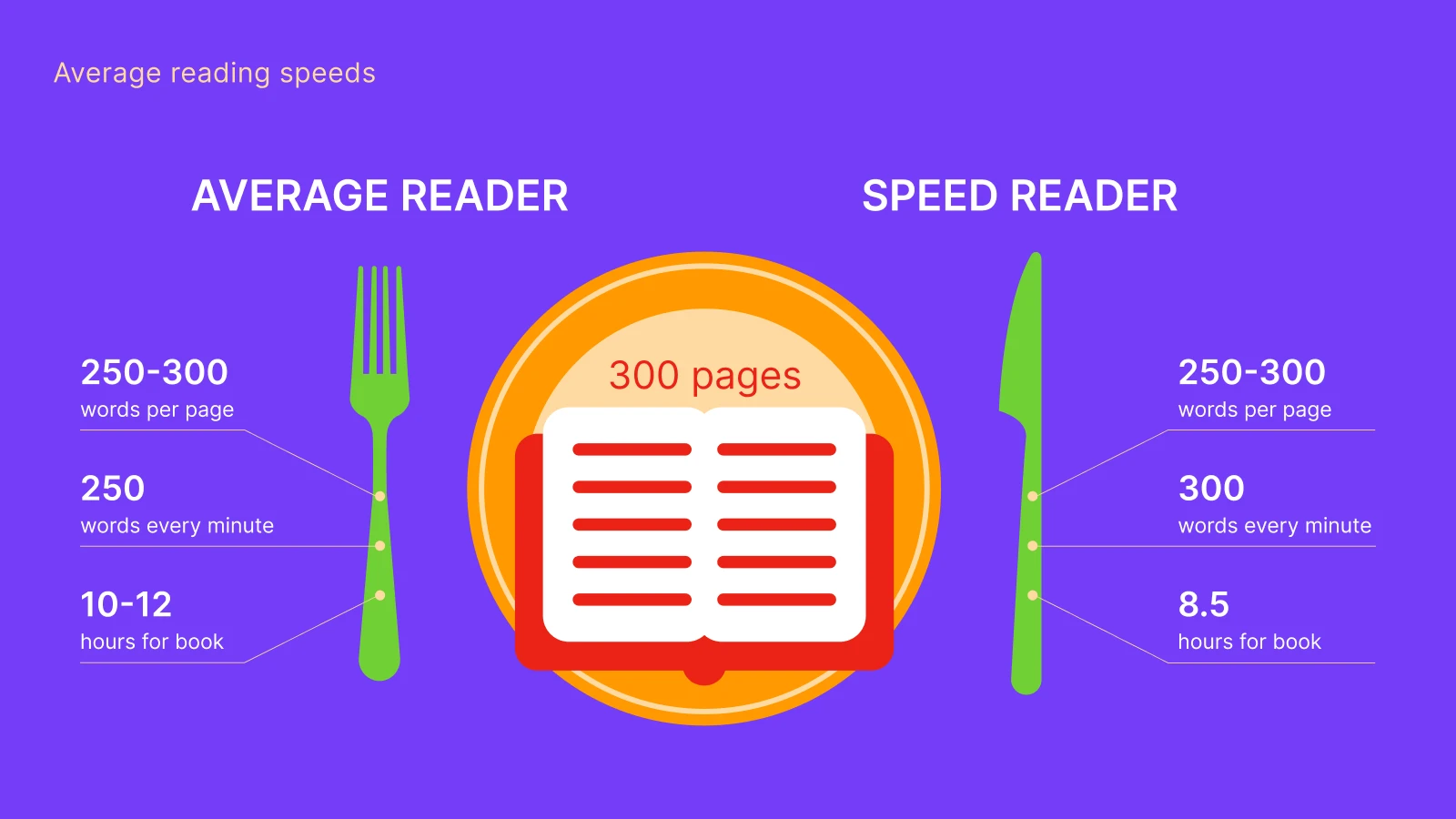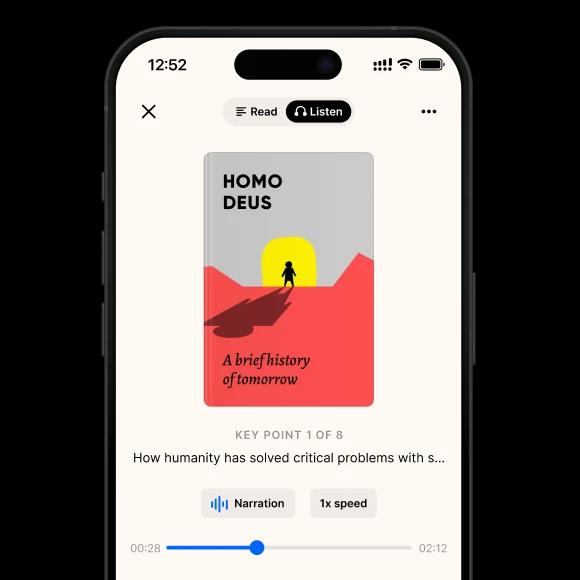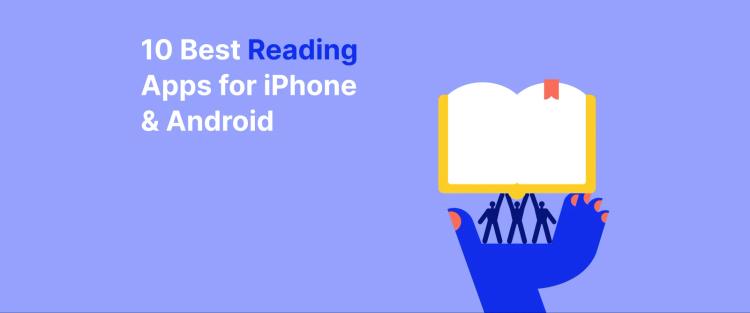On average, it takes 8.5 to 12 hours to read a 300-page book, depending on your reading speed. Most readers average 200 to 300 words per minute, but experienced readers or those using speed-reading techniques can complete the task faster.
But that's just the beginning.
If you want to reduce that time significantly and still enjoy or retain what you read, we'll show you proven techniques to boost your speed — plus what factors can make or break your reading time.
Average reading speeds for a 300-page book
It's important to remember that we're all different. That also means different reading speeds depending on how we feel on any given day. But let's talk averages here.
Generally, most people can read between 200-300 words per minute (wpm). So, even if you're a slow reader, you will cover at least 200 words every 60 seconds. A fast reader will hit the highest part of the bracket and, in some cases, may even exceed it.
We can break it down even further.
A standard book page usually has between 250-300 words. Let's jump into the middle of our speed bracket and say you can read 250 words every minute. With handy math, it will take between 10-12 hours to read a 300-page book.
If you're a fast reader and can read 300 wpm or more, your general reading time will be around 8.5 hours.
But there's a spanner to throw in the works. There are many things that can affect your reading speed. Maybe you didn't sleep well, and you're tired. Perhaps you're distracted by a problem with your partner. Your office is particularly busy. The list goes on.
In fact, let's jump further into that subject and learn about even more factors that have an effect on your reading speed.
What affects how long it takes to read a 300-page book?
Some books flow into your mind easier than others. The 'Harry Potter' series, for example, are books that you're unlikely to be able to put down if you're into fantasy novels. Or you're more of a Stephen King fan and love a horror story.
Whether it's a novel or a non-fiction book, certain things can affect the reading speed of the average reader. In fact, even the fastest reader occasionally finds themselves thrown for a loop.
Let's take a look at some of the most common things that affect reading speed and retention, be it an epic fantasy or a business book.
Vocabulary and language proficiency
People with a larger vocabulary and stronger language skills often read faster, as they can quickly process and understand written content. But it also depends on the type of book you're reading. A book with simple vocabulary will take less time than a book packed with complex words and ideas. That type of book can still be mastered within a single day, but it takes much more effort.
Comprehension and concentration
The ability to concentrate and comprehend the text being read plays a crucial role in reading speed. Strong concentration skills can help you stay focused and process information faster, but these are things that vary from day to day.
Some days it's easier to focus and concentrate than others, don't you find? If you're feeling tired or under the weather, this can all affect how you can concentrate on the words on a page.
Experience and practice
Like any skill, reading speed can improve with practice and experience. Regular reading habits can help you become more efficient readers over time. So, you need to find more fantastic books to read and practice your speed reading skills. What a fantastic excuse to find a new book!
Eye movement and tracking
Efficient eye movements and tracking are essential for fast reading. If you're someone who can move your eyes smoothly across the page and quickly recognize words, you'll tend to read faster.
Visual processing speed
The speed at which your brain processes visual information can also affect reading speed. Faster visual processing can lead to quicker word recognition and comprehension. This tends to be something that fast readers have.
Distractions and environment
External distractions, such as noise or interruptions, can slow down reading speed. A quiet and comfortable reading environment can help improve focus and reading efficiency. So, if your children, friends, family, or anyone else in your area is noisy, tell them to be quiet or go into another room!
Now, we know what you're thinking. Isn't reading supposed to be enjoyed and not rushed through?
Well, yes, generally. But if you're trying to learn quickly about a subject or you have a book that you need to memorize, speed reading is a key skill. There's an idea that reading fast means reading badly, but nothing could be further from the truth.
As Kam Knight tells us in his book 'Speed Reading,' if you can read faster, you'll also understand the words better. Of course, it doesn't mean you can't still enjoy what you're reading. You just need to be like Usain Bolt and race a little faster!
10 tips to improve reading speed and comprehension
The good news is that you can improve your reading speed, and it won't take a lot of effort. Becoming a speed reader will take practice, and you know what they say: practice makes perfect!
To help you out, here are ten tips to help improve your reading speed:
Set specific reading goals
What do you want to achieve? Do you want to finish a certain number of pages or to comprehend key information? For example, if you have a college assignment due, set a goal to read a certain number of pages each day to stay on track.
In his book 'Speed Reading,' Kam Knight recommends asking yourself why you're reading the book. It will focus your mind and avoid the chaotic landscape that often appears when your brain doesn't have a purpose. He says:
"Since purpose has such power, anytime you sit down to read, set a goal or purpose. Determine beforehand what you want or hope to gain from the material."
Use a pointer or guide
Moving a pen, pencil, or your finger along the text as you read can help guide your eyes and increase focus. For example, when reading a dense article, use a ruler to underline the sentences as you read to maintain your pace.
It doesn't matter what type of book it is; if you're distracted or your environment is loud, it's going to be hard to focus. Using a pointer or guide can keep your eyes and mind where necessary.
Practice word chunking
Train your eyes to recognize groups of words at a time rather than focusing on individual words, which can help you read faster. This is a strategy that Kam Knight particularly advocates as a great way to become a speed reader and fill your mind with all types of wonderful information.
To do it, instead of reading word by word, try to scan phrases or sections at a time to pick up the main points.
Reduce subvocalization
Subvocalization refers to silently pronouncing words as you read, unnecessarily slowing down your reading speed. Try to minimize this habit. A good way to do that is to purposely close your mouth as you're reading. It sounds ridiculous, but it really works.
Also, when reading silently to yourself, consciously try to let go of sounding out each word in your head and focus on comprehending the meaning instead.
Improve your vocabulary
The more words you know, the quicker you can read and understand written material, as you won't have to pause to look up unknown words. The best way to increase your vocabulary is to read even more. You could also make it a habit to learn a new word each day and try to use it in conversation or writing to reinforce your vocabulary.
In his 'How to Read a Book,' Mortimer J Adler points out that you don't have to understand every single word, but to get the gist of the entire book.
"In the case of good books, the point is not to see how many of them you can get through, but rather how many can get through to you."
Enhance your comprehension skills
Understanding the material will help you read faster since you won't need to go back and re-read sections to grasp the meaning. Even an avid reader sometimes needs to do this, but it's a real time-waster.
After finishing a chapter, summarize the key points in your own words to ensure you've understood the content. That way, you'll retain the information and won't forget it after ten minutes.
A great resource on improving comprehension and learning techniques is the book 'Learning How to Learn' by Barbara Oakley and Terrence Sejnowski. It offers practical strategies to help you absorb and retain information more effectively — a skill that complements any effort to boost your reading speed.
Eliminate distractions
Sometimes, the simplest methods work the best! Find a quiet, comfortable space to read without interruptions to maintain focus and improve your reading speed. Turn off notifications on your phone or designate a specific reading time each day when you know you won't be disturbed.
"Internal and external interruptions are inevitable, but it's how you deal with them that counts." - Francesco Cirillo, 'The Pomodoro Technique.'
For more on mastering focus and minimizing distractions, Cal Newport's book 'Deep Work' provides powerful techniques for cultivating intense concentration — essential for productive, distraction-free reading sessions.Utilize speed reading techniques
Techniques such as skimming, scanning, and meta-guiding can help you train your eyes to move swiftly across the text. A good place to start is with online articles. Skim the main headings and subheadings to get an overview before diving into the details.
Take breaks
Reading for extended periods without breaks can lead to fatigue and decreased comprehension. In his book 'The Pomodoro Technique,' Francesco Cirillo advises taking short breaks to rest your eyes and mind. Read for 25 minutes, then take a 5-minute break to stretch, walk around, or grab a drink before continuing. If you're interrupted, put it off until your break time.
We know what you're thinking: you're trying to improve your reading speed, and taking breaks is counterproductive. Wrong! You'll actually speed up if you take breaks because you'll refresh your mind and concentration.
Practice regularly
Like any skill, reading speed improvement takes practice. Set aside time each day to read different material and work on implementing these tips. Challenge yourself to read a book outside your usual genre to expose yourself to new vocabulary and styles of writing.
In 'How to Read a Book,' Mortimer J Adler tells us that there are four reading levels. They are elementary, inspectional, analytical, and syntopical. The level you'll use depends on the type of book you're reading. So, by mixing up different books, you'll develop new skills. And if you're worried about not understanding everything the first time, don't. Adler tells us:
"Finally, do not try to understand every word or page of a difficult book the first time through. This is the most important rule of all; it is the essence of inspectional reading."
Improving your reading speed takes time. It's not going to come to you overnight by a lightning bolt. But reading is fun either way, so it won't feel like a hardship. By incorporating these tips into your reading routine, you can gradually increase your reading speed and efficiency while maintaining comprehension and enjoyment of what you're reading.
Increase your reading speed with Headway
There's a good reason why audiobooks have become so popular: because they allow you to take on board information and stories faster. But sometimes you need to, or want to, actually read. The good news is that you can learn how to read a 300-page book in just one day if you put your mind to it. And yes, you can understand it too.
Plus, Headway allows you to do both: listen and read!
It might sound like you don't have to have skills to read a book other than actually being able to read English or any other language the text is in. But in order to become a fast reader, you need to learn a few key skills. On the Headway app, you can read summaries of bestselling books related to speed reading and reading strategies. 'Speed Reading' by Kam Knight and 'How to Read a Book' by Mortimer J Adler are just two of the top reads on offer.
With tips on how to read faster, you'll be able to master any subject in less time. So, download the Headway app today and get started!
Frequently Asked Questions
Can you read a 300-page book in one day?
Yes, many readers can finish a 300-page book in one day. At an average speed of 250 to 300 words per minute, it would take about 8 to 12 hours. Faster readers or those using speed reading strategies might finish sooner.
How long does it take for a slow reader to read a 300-page book?
For slow readers, typically reading 150 to 200 words per minute, it takes between 15 to 20 hours to read a 300-page book, depending on its complexity.
Can I read 250 pages in 4 hours?
Yes, if you read at around 62 to 65 pages per hour, you can complete 250 pages in four hours. This requires a reading speed of about 300 to 350 words per minute, which is achievable for fast readers.
Can you read a 200-page book in a day?
Yes, reading a 200-page book in a day is manageable for most people. At a pace of 40 to 60 pages per hour, it would take between 4 and 6 hours, depending on the reader's speed and the book's difficulty.
Why am I slow at reading?
Reading speed can be influenced by vocabulary size, concentration, reading habits, unfamiliarity with the subject matter, or subvocalization (silently pronouncing words). Identifying and addressing these factors can help improve your speed. Consider finding a good read, something you will enjoy, to improve your process.
How fast do most people read?
Most adults read between 200 and 300 words per minute. This translates to about 40 to 60 pages per hour for average reading material. However, remember that it's not so much about the word count as it is about information retention.
Is reading 20 pages an hour slow?
Yes, reading 20 pages an hour is slower than average. Most casual readers cover about 30 to 50 pages per hour when reading a typical page novel or a collection of short stories. However, reading speed can vary based on the book's complexity, the reader's familiarity with the subject, and whether the material requires deep concentration.










